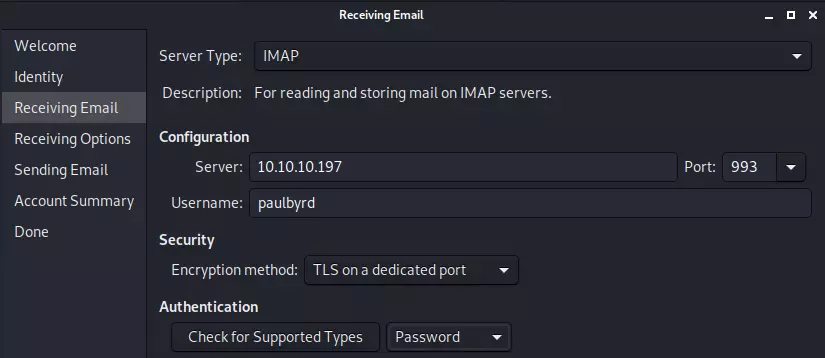8.2 KiB
143,993 - Pentesting IMAP
{% hint style="success" %}
Learn & practice AWS Hacking: HackTricks Training AWS Red Team Expert (ARTE)
HackTricks Training AWS Red Team Expert (ARTE)
Learn & practice GCP Hacking:  HackTricks Training GCP Red Team Expert (GRTE)
HackTricks Training GCP Red Team Expert (GRTE)
Support HackTricks
- Check the subscription plans!
- Join the 💬 Discord group or the telegram group or follow us on Twitter 🐦 @hacktricks_live.
- Share hacking tricks by submitting PRs to the HackTricks and HackTricks Cloud github repos.
Internet Message Access Protocol
The Internet Message Access Protocol (IMAP) is designed for the purpose of enabling users to access their email messages from any location, primarily through an Internet connection. In essence, emails are retained on a server rather than being downloaded and stored on an individual's personal device. This means that when an email is accessed or read, it is done directly from the server. This capability allows for the convenience of checking emails from multiple devices, ensuring that no messages are missed regardless of the device used.
By default, the IMAP protocol works on two ports:
- Port 143 - this is the default IMAP non-encrypted port
- Port 993 - this is the port you need to use if you want to connect using IMAP securely
PORT STATE SERVICE REASON
143/tcp open imap syn-ack
Banner grabbing
nc -nv <IP> 143
openssl s_client -connect <IP>:993 -quiet
NTLM Auth - Information disclosure
If the server supports NTLM auth (Windows) you can obtain sensitive info (versions):
root@kali: telnet example.com 143
* OK The Microsoft Exchange IMAP4 service is ready.
>> a1 AUTHENTICATE NTLM
+
>> TlRMTVNTUAABAAAAB4IIAAAAAAAAAAAAAAAAAAAAAAA=
+ TlRMTVNTUAACAAAACgAKADgAAAAFgooCBqqVKFrKPCMAAAAAAAAAAEgASABCAAAABgOAJQAAAA9JAEkAUwAwADEAAgAKAEkASQBTADAAMQABAAoASQBJAFMAMAAxAAQACgBJAEkAUwAwADEAAwAKAEkASQBTADAAMQAHAAgAHwMI0VPy1QEAAAAA
Or automate this with nmap plugin imap-ntlm-info.nse
IMAP Bruteforce
Syntax
IMAP Commands examples from here:
Login
A1 LOGIN username password
Values can be quoted to enclose spaces and special characters. A " must then be escape with a \
A1 LOGIN "username" "password"
List Folders/Mailboxes
A1 LIST "" *
A1 LIST INBOX *
A1 LIST "Archive" *
Create new Folder/Mailbox
A1 CREATE INBOX.Archive.2012
A1 CREATE "To Read"
Delete Folder/Mailbox
A1 DELETE INBOX.Archive.2012
A1 DELETE "To Read"
Rename Folder/Mailbox
A1 RENAME "INBOX.One" "INBOX.Two"
List Subscribed Mailboxes
A1 LSUB "" *
Status of Mailbox (There are more flags than the ones listed)
A1 STATUS INBOX (MESSAGES UNSEEN RECENT)
Select a mailbox
A1 SELECT INBOX
List messages
A1 FETCH 1:* (FLAGS)
A1 UID FETCH 1:* (FLAGS)
Retrieve Message Content
A1 FETCH 2 body[text]
A1 FETCH 2 all
A1 UID FETCH 102 (UID RFC822.SIZE BODY.PEEK[])
Close Mailbox
A1 CLOSE
Logout
A1 LOGOUT
Evolution
apt install evolution
CURL
Basic navigation is possible with CURL, but the documentation is light on details so checking the source is recommended for precise details.
- Listing mailboxes (imap command
LIST "" "*")
curl -k 'imaps://1.2.3.4/' --user user:pass
- Listing messages in a mailbox (imap command
SELECT INBOXand thenSEARCH ALL)
curl -k 'imaps://1.2.3.4/INBOX?ALL' --user user:pass
The result of this search is a list of message indicies.
Its also possible to provide more complex search terms. e.g. searching for drafts with password in mail body:
curl -k 'imaps://1.2.3.4/Drafts?TEXT password' --user user:pass
A nice overview of the search terms possible is located here.
- Downloading a message (imap command
SELECT Draftsand thenFETCH 1 BODY[])
curl -k 'imaps://1.2.3.4/Drafts;MAILINDEX=1' --user user:pass
The mail index will be the same index returned from the search operation.
It is also possible to use UID (unique id) to access messages, however it is less conveniant as the search command needs to be manually formatted. E.g.
curl -k 'imaps://1.2.3.4/INBOX' -X 'UID SEARCH ALL' --user user:pass
curl -k 'imaps://1.2.3.4/INBOX;UID=1' --user user:pass
Also, possible to download just parts of a message, e.g. subject and sender of first 5 messages (the -v is required to see the subject and sender):
$ curl -k 'imaps://1.2.3.4/INBOX' -X 'FETCH 1:5 BODY[HEADER.FIELDS (SUBJECT FROM)]' --user user:pass -v 2>&1 | grep '^<'
Although, its probably cleaner to just write a little for loop:
for m in {1..5}; do
echo $m
curl "imap://1.2.3.4/INBOX;MAILINDEX=$m;SECTION=HEADER.FIELDS%20(SUBJECT%20FROM)" --user user:pass
done
Shodan
port:143 CAPABILITYport:993 CAPABILITY
HackTricks Automatic Commands
Protocol_Name: IMAP #Protocol Abbreviation if there is one.
Port_Number: 143,993 #Comma separated if there is more than one.
Protocol_Description: Internet Message Access Protocol #Protocol Abbreviation Spelled out
Entry_1:
Name: Notes
Description: Notes for WHOIS
Note: |
The Internet Message Access Protocol (IMAP) is designed for the purpose of enabling users to access their email messages from any location, primarily through an Internet connection. In essence, emails are retained on a server rather than being downloaded and stored on an individual's personal device. This means that when an email is accessed or read, it is done directly from the server. This capability allows for the convenience of checking emails from multiple devices, ensuring that no messages are missed regardless of the device used.
https://book.hacktricks.xyz/pentesting/pentesting-imap
Entry_2:
Name: Banner Grab
Description: Banner Grab 143
Command: nc -nv {IP} 143
Entry_3:
Name: Secure Banner Grab
Description: Banner Grab 993
Command: openssl s_client -connect {IP}:993 -quiet
Entry_4:
Name: consolesless mfs enumeration
Description: IMAP enumeration without the need to run msfconsole
Note: sourced from https://github.com/carlospolop/legion
Command: msfconsole -q -x 'use auxiliary/scanner/imap/imap_version; set RHOSTS {IP}; set RPORT 143; run; exit'
{% hint style="success" %}
Learn & practice AWS Hacking: HackTricks Training AWS Red Team Expert (ARTE)
HackTricks Training AWS Red Team Expert (ARTE)
Learn & practice GCP Hacking:  HackTricks Training GCP Red Team Expert (GRTE)
HackTricks Training GCP Red Team Expert (GRTE)
Support HackTricks
- Check the subscription plans!
- Join the 💬 Discord group or the telegram group or follow us on Twitter 🐦 @hacktricks_live.
- Share hacking tricks by submitting PRs to the HackTricks and HackTricks Cloud github repos.
